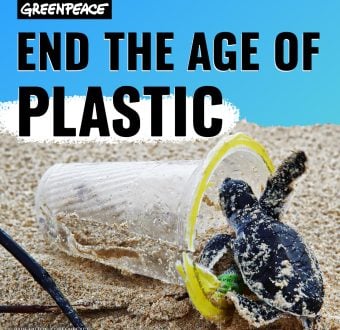PURCHASE, NEW YORK (July 20, 2022) – Today, Greenpeace USA flew its thermal airship by PepsiCo’s headquarters with banners that read, “The New Pepsi Challenge: Ditch Plastic,” and “Pepsi vs. Coca-Cola: Who will lead on reuse and refill?”
The action comes during Plastic Free July, a movement that traditionally challenges people to reduce plastic in their everyday lives. This year, Greenpeace is calling out the plastic pollution crisis at its source: the corporations responsible for producing billions of plastic packaging every year. According to global brand audits, PepsiCo is one of the world’s worst plastic polluters. The company produces more than five billion pounds of plastic per year. It also has no reusable packaging and has not reported that any aspect of its portfolio is designed for reuse.
While the company has announced its intent to make a reuse and refill commitment by the end of the year, its longtime rival, Coca-Cola, announced in February its commitment of at least 25% reusables by 2030. Neither company’s actions to date are sufficient for tackling the crisis we face. Plastic pollutes through its entire lifecycle, harming communities, ecosystems, and human health.
Greenpeace USA Senior Plastics Campaigner Lisa Ramsden, who is on the ground in Purchase, said: “PepsiCo has an opportunity to show leadership and ambition that match the scale of the crisis they’ve helped create by significantly reducing their plastic footprint and setting industry-leading reuse and refill targets. For far too long, PepsiCo has largely focused on recycling as a solution to its enormous plastic footprint, while also increasing its plastic production. However, only 9% of plastic ever produced has been recycled. Recycling alone is simply never going to solve the single-use plastics crisis. We expect to see PepsiCo go even farther than Coca-Cola’s lackluster commitment by investing in 50% reusable packaging by 2030.”
A new report released this week highlights health impacts — particularly in children — from antimony, a toxic element frequently found in PET plastic. The majority of PepsiCo’s beverages are bottled in PET plastic. Antimony was discovered in all of the tested samples of PET bottled beverages, including PepsiCo’s, with many reportedly containing unsafe levels.
###
Contact: Tyler Kruse, Greenpeace USA Senior Communications Specialist, P: 808-741-2791, E: [email protected]
Greenpeace USA is part of a global network of independent campaigning organizations that use peaceful protest and creative communication to expose global environmental problems and promote solutions that are essential to a green and peaceful future. Greenpeace USA is committed to transforming the country’s unjust social, environmental, and economic systems from the ground up to address the climate crisis, advance racial justice, and build an economy that puts people first. Learn more at www.greenpeace.org/usa.






